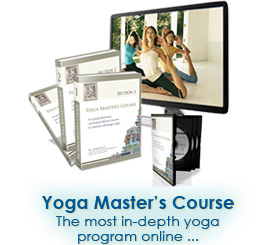[ Excerpt from The Science of Yoga, page 237 ]
Since the foundations of yoga spring forth from the ancient culture of the Vedic Hindus of India, their symbolism also permeates the language of yoga.
It would not be correct to refer to Hinduism as a philosophy, yet nor is it a well-defined religion. It is, rather, an immense and complex socio-religious organism comprised of countless sects and various systems of philosophy -- many with their own distinct disciplines, rituals, ceremonies and manners of worship.
Though Hinduism has brought forth a large number of outstanding spiritual teachers expounding the science of yoga, and although the roots of yoga and Hinduism are intimately entwined, yoga itself should not be confused with Hinduism, nor should it be viewed as a religion.
Nowhere within the system of Ashtanga yoga, has Patanjali dealt with the subject of yoga as a religion, or for that matter as anything but a pragmatic, verifiable, experiential science.
But to understand the symbolism in yoga, it is helpful to have a picture of its origins within the ancient Vedic culture and the roots of Hindu thought. To begin with, spiritualists and sages, such as the great Rishis of ancient Bharata (India) were not so much interested in the description of reality, but rather only of the direct experience of it.
However, when the prospect of conveying these experiences to other people arose, they were then confronted with the limitations of language’s ability to adequately do so. This problem has been dealt with in various ways in different Eastern traditions.
Whereas the Taoist of ancient China used paradoxes -- in India, myths, metaphors, allegories and much symbolism became the way to convey ideas beyond the limits of the logical mind. As Ananda Coomaraswamy, the great 20th century historian suggests that "Myth embodies the nearest approach to absolute truth that can be stated in words."
Renowned physicist Fritjof Capra relates this character of the Hindu pantheon in The Tao of Physics:
“The rich Indian imagination has created a vast array of gods and goddesses whose incarnations and exploits are the subjects of fantastic tales, collected in epics of huge dimensions. The Hindu with deep insight knows that all these gods are creations of the mind, mythical images representing the many faces of reality. On the one hand, he or she also knows that they were not merely created to make the stories more attractive, but are essential vehicles to convey the doctrines of a philosophy rooted in mystical experience."
But the Western tendency has always been to brush off this Eastern cultural and spiritual tradition as mere superstition without proper investigation or understanding of its philosophy and scientific method. As Capra concludes:
"In eastern mysticism it has always been realized that reality transcends ordinary language, and the sages of the East were not afraid to go beyond logic and common concepts. This is the main reason, I think, why their models of reality constitute a more appropriate philosophical background then the models of western philosophy."
The teachings of yoga are ripe with the mythical traditions of ancient Indian culture. Much of its profound teaching springs forth in such legends as the Ramayana (The story of King Rama) or the classical epic, Mahabharata, which contains within it countless episodes illustrating the moralities and ethics at the foundation of the higher life, as well the most insightful treatise on karma yoga (the "yoga of right action") in the Bhagavad Gita.
The Western student of yoga who endeavours to peer past the general attitude of disregard toward the Indian heritage of yoga by some of their fellow Western yogis, and gaze deeply into the mythical symbolism within the body of yoga, along with its rich foundations within the culture heritage of India, will indeed find a springboard toward greater insight, wisdom and spiritual understanding...
[Continued...]
---------------------
NOTE: This yoga article is an excerpt from The Science of Yoga, an online yoga training program with streaming yoga videos and 600 pages of step-by-step yoga instruction.

"The Science of Yoga is a course worthy of
leather binding and an honored place in the
finest libraries in the world
... It is indeed a masterful work."
Dr. John Michael Christian
AwakeningWithYoga.com
Learn More About
The Science of Yoga Course
|






